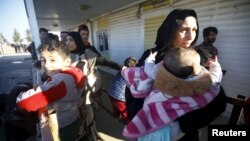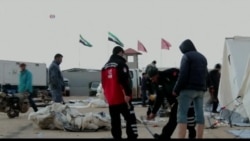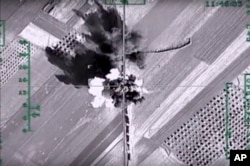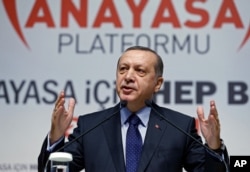For the first time since August 2013, forces loyal to Syrian President Bashar al-Assad are within 25 kilometers of the Turkish border in northern Syria.
They continue to press a Russian-backed offensive that is throwing moderate rebel forces into disarray and despondency, say activists and insurgent commanders.
Turkish officials are warning that the round-the-clock Russian air sorties and heavy fighting could spark the arrival of as many as 600,000 fleeing Syrian civilians at its border, but they reiterated their determination that the refugees stay on the Syrian side of the frontier.
“Our objective for now is to keep this wave of migrants on the other side of Turkey's borders as much as is possible, and to provide them with the necessary services there,” said Deputy Prime Minister Numan Kurtulmuş.
WATCH: Related video by Zlatica Hoke
Following a Cabinet meeting, he said, “As a consequence of this situation, we are seeing 200,000 people being forced to flee, 65,000 in the direction of Turkey and 135,000 inside Syria.”
Multisided conflict
The multisided conflict raging in the northern Aleppo countryside features regime forces, Western-backed Free Syrian Army militias and their allies, Islamist brigades, al-Qaida’s affiliate in Syria, the Kurds and the jihadist Islamic State group.
Two mainly Sunni Arab villages in the northern Aleppo countryside, Deir Jamal and Mar’anaz, asked fighters with the Kurdish People’s Protection Units, the YPG, to occupy them in a bid to escape ferocious Russian airstrikes, according to the Syrian Observatory for Human Rights.
Rebel commanders said YPG territory wasn't being bombed and that was clear evidence of collusion between Damascus and Syrian Kurdish leaders, a claim denied by the YPG.
The fate of the strategically important air base at Menagh nearby remains unclear.
The base, which anti-Assad rebels captured after a lengthy siege in August 2013, is being targeted by Russian warplanes, according to Zakaria Malahefji, the political officer of the 3,000-member Fastaqim Kama Umirt, a brigade aligned with the rebel alliance Jaish al-Mujahideen (Army of Holy Warriors).
Kurdish fighters
The YPG, however, holds two nearby villages, and reports mounted late Tuesday that the YPG had launched attacks on the base.
General Salim Idris, the former FSA chief, who still advises moderate militias on strategy, told VOA that the YPG and Arab allies in the Syrian Democratic Forces had launched attacks on the base but they “have not taken it yet.”
The YPG insists it is not colluding with the regime in the government offensive. YPG commanders say their control of Deir Jamal and a road running south has prevented the regime forces, mainly consisting of Iranian guardsmen and Shi’ite fighters from Lebanon’s Hezbollah movement and Afghanistan, from advancing.
The YPG said it transferred Sunni Arab families fleeing the fighting to the Kurdish enclave of Afrin.
The YPG said the refugee transfer aims “to prove to everyone that Syria is for all its citizens" and that the YPG "is not fighting Arabs as promoted by the media.”
During the weekend, Salih Muslim, the leader of the Democratic Union Party that dominates the YPG, told VOA he doubted the current offensive would impact Syrian Kurdish hopes for semiautonomy.
“The fighting is not in Kurdish areas, it is close to them. The Kurdish forces are not involved in the fighting, although some Arab allies of the YPG have been fighting Jabhat al-Nusra,” he added. He said the bulk of YPG forces to the east of the Euphrates would not cross west of the river unless it was in coordination with the U.S.-led international coalition against the Islamic State group. “It would be easy to do.”
Drawn into fighting
His biggest worry is that Turkish forces may be drawn into the fighting.
Turkish President Recep Tayyip Erdogan has frequently warned Ankara would not stand by and allow Kurdish advances in northern Syria or the establishment of a semiautonomous Kurdish entity to emerge in northern Syria.
Conditions at the border
A Turkish official told VOA there were no plans by Ankara to open the border to the new refugees streaming toward it. A new camp is being established by the Turkish Red Crescent and IHH Humanitarian Relief Foundation, a Turkish NGO, adding family tents to 20 collective tents erected earlier this week.
According to the Turkish Red Crescent, 2,400 families have been registered at the new camp that is being built for about 15,000 people. There are another 5,000 refugees scattered nearby.
According to VOA’s translator, who crossed the border Tuesday: “The refugees are being fed one meal a day. Most are from the northern Aleppo towns of Tell Rifaat and Mara and from IS-controlled towns such as Al-Bab.
"I saw no mattresses or blankets being distributed. There is no running water, no heat, and the conditions are very bad and squalid. The refugees are very disoriented. Most came with just the clothes on their back. A medic with the Syrian charity the Independent Doctors Association told me he and his colleagues had treated 183 sick people, mainly suffering diarrhea, vomiting and fever."
An engineer from Tell Rifaat told VOA’s translator the bombing raids were very intense and he saw five Russian warplanes overhead. He said hundreds were fleeing the town. The translator also saw a 3-year-old transferred across the border into Turkey suffering major head and neck wounds.









